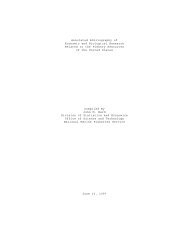West Coast Groundfish Observer Program Manual, Part2 - NOAA
West Coast Groundfish Observer Program Manual, Part2 - NOAA
West Coast Groundfish Observer Program Manual, Part2 - NOAA
You also want an ePaper? Increase the reach of your titles
YUMPU automatically turns print PDFs into web optimized ePapers that Google loves.
APPENDIX P<br />
member injures themself [sic] in the factory. Considering the Jones Act, the lawyers would have a<br />
field day.’’<br />
Response: NMFS believes this comment refers to the possible use of an observer’s safety<br />
determinations as evidence in a law suit. As stated in the responses to comments 3 and 16, this rule is<br />
not intended to give observers the authority to make actual determinations as to a vessel’s<br />
compliance with USCG regulations. Rather, it simply requires that a vessel, if its safety has been<br />
called into question, rectify the shortcoming or submit to a new USCG safety examination or<br />
inspection. If anything, this rule is likely to reduce the number of negligence claims because vessels<br />
with questionable safety issues will correct them or be reexamined by USCG before fishing.<br />
Comment 21: The USCG should be consulted.<br />
Response: The USCG was involved at every stage of development of this rule.<br />
Comment 22: One commenter raised specific issues about an observer who was terminated and<br />
who subsequently filed suit.<br />
Response: Because the case is before the court, it would be inappropriate for NMFS to respond at<br />
this time.<br />
Changes From the Proposed Rule<br />
Four changes were made from the proposed rule. One was made in response to comments: A<br />
provision was added at § 600.746(c)(3) to provide guidance on the scope of the observer’s pre-trip<br />
safety check.<br />
Another change was made to clarify that USCG performs either an inspection or an examination:<br />
The words ‘‘examination or inspection’’ replaced ‘‘inspection’’ in §§ 600.725(p), 600.746(c)(1), and<br />
600.746(d)(1) so that it is clear that either an examination or an inspection can be performed.<br />
The word ‘‘Examination’’ was inserted in § 600.746(c)(1) in order to more clearly identify the<br />
Commercial Fishing Vessel Safety Examination decal.<br />
The word ‘‘examine’’ replaced ‘‘inspect’’ in § 600.746(c)(2) in order to avoid confusion with<br />
USCG inspection.<br />
The observer’s pre-trip safety check of a vessel that displays a current Commercial Fishing Vessel<br />
Safety Examination decal will normally consist of no more than a spot check of the equipment<br />
identified in § 600.746(c)(3), i.e., PFDs/immersion suits; ring buoys; distress signals; fire<br />
extinguishing equipment; emergency position indicating radio beacon, when required; survival craft,<br />
when required; and a walk through major spaces. This walkthrough is not intended to broaden the<br />
scope of the safety check. The safety check should be done expeditiously because the decal indicates<br />
that the vessel has already undergone an extensive dockside inspection.<br />
Classification<br />
At the proposed rule stage, NMFS certified to the Assistant General Counsel for Legislation and<br />
Regulation, Department of Commerce and to the Chief Counsel for Advocacy, Small Business<br />
Administration that this action would not result in a significant economic impact on a substantial<br />
number of small entities. Comments received on the proposed rule suggested that small entities<br />
might experience a significant economic impact as a result of the rule. Based on this new<br />
information, NMFS decided to prepare a Final Regulatory Flexibility Analysis (FRFA). The FRFA<br />
concludes that the rule’s authorization for an observer to refuse to board a vessel that the observer<br />
believes to be unsafe and the rule’s requirement that a vessel required to carry an observer cannot<br />
legally fish without the observer make it possible that implementation of this rule could delay a<br />
vessel’s departure for a fishing trip. Because of variations in the structures of different fisheries’<br />
mandatory observer programs and in the structures of the different fishery management regimes, the<br />
fact that an observer refused to board would not necessarily mean that the vessel would lose fishing<br />
time as might be the case in those fisheries where vessels are allowed a limited number of days<br />
fishing per year. It is not possible to estimate accurately how many, if any, vessels would lose days at<br />
A-46<br />
1/30/2004
















